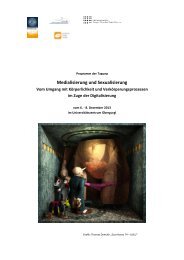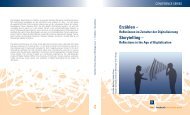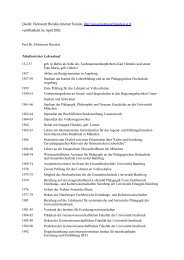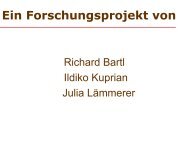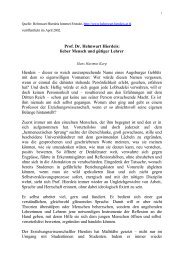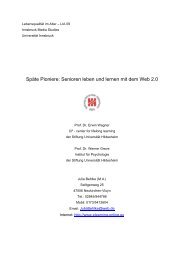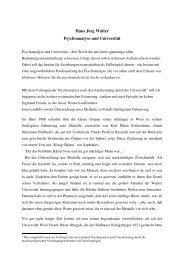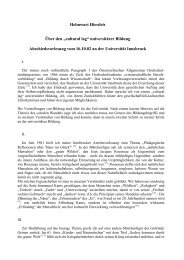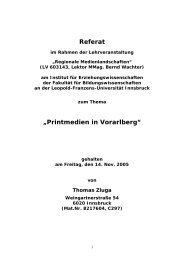Download pdf - Universität Innsbruck
Download pdf - Universität Innsbruck
Download pdf - Universität Innsbruck
Sie wollen auch ein ePaper? Erhöhen Sie die Reichweite Ihrer Titel.
YUMPU macht aus Druck-PDFs automatisch weboptimierte ePaper, die Google liebt.
118 Andrea Hemetsberger<br />
ledge creation practices thus, accumulating member-generated expertise; cultural norms<br />
and values translate into sources of social identification through passage of culture; social<br />
approval becomes publically significant recognition; and communal ties turn into advocacy,<br />
and resistant forces. Yet, sharing is not to be misunderstood as gift-giving, or as<br />
mere exchange. Sharing, according to Belk (2010), tends to be a communal act of giving<br />
and taking that links us to other people. It is not the only way in which we may connect<br />
with others, but it is a potentially powerful one that creates feelings of solidarity and<br />
bonding.<br />
The purpose of this article is to explore and conceptualize key practices and dynamics of<br />
sharing in F/OSS projects, and discuss their theoretical and practical implications for<br />
online sharing cultures.<br />
Exchange, gift-giving, and sharing<br />
From its early days on, the Internet culture was built on norms of collaboration, cooperation,<br />
and a willingness to share resources when others requested them (Rheingold, 2000).<br />
As Belk (2010) has observed, sharing expertise, labor, ideas, and more is a quite common<br />
practice within peoples’ private domains, and increasingly online. The Internet as a technology<br />
and open space has provided a potent infrastructure for sharing on a global basis.<br />
Social practices of sharing in F/OSS communities have been approached from various<br />
perspectives, including economic views (Lerner & Tirole, 2001), community of practice<br />
and knowledge sharing (Lee & Cole, 2003; Lanzara & Morner, 2005; Hemetsberger &<br />
Reinhardt, 2006), theories of social exchange (Hemetsberger, 2001b), gift-giving (Raymond,<br />
1999; Bergquist and Ljundberg, 2001; Hemetsberger, 2001b; Zeitlyn, 2003), and<br />
movemental, ideological notions of sharing (Hemetsberger, 2007).<br />
Whereas economic models force practices of sharing into a non-altruist, capitalist logic of<br />
an individual profit rationale, community of practice and social exchange approaches provide<br />
much more elaborate explanations into the multifacetedness of sharing. F/OSS practices<br />
of knowledge sharing and creation have been described as strongly technology-mediated<br />
(Lanzara & Morner, 2005), with a strong emphasis on social norms of sharing knowledge,<br />
and an extensive culture of open access to archives and mailing lists that enable<br />
community members to re-experience collective reflection. Whilst research in this area is<br />
elaborate and insightful with respect to knowledge sharing, other important facets of<br />
sharing enjoy only limited attention within this field.<br />
Social exchange theories focus attention on the relations between actors and the factors<br />
that explain the emergence, maintenance and termination of exchange. In contrast to most<br />
offline exchange relationships, online collaboration mostly constitutes a complex system<br />
of exchange (Bagozzi, 1974, 1975) involving a potentially huge number of social actors,<br />
who enter and maintain relationships with the expectation that doing so will be rewarding<br />
(Blau, 1964). Whereas most economic transactions are simultaneous exchanges, social



